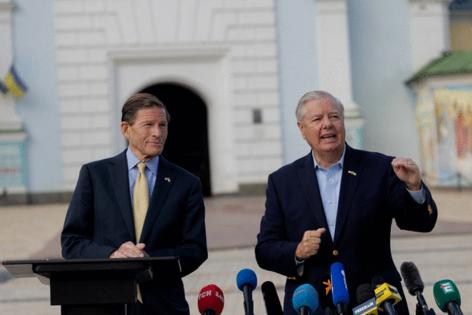Trump's appetite for punishing Putin is about to get a key test
Published in News & Features
Sen. Lindsey Graham’s vow to act on a bill imposing new sanctions on Russia is set to test whether President Donald Trump is finally ready to punish Vladimir Putin for delaying a ceasefire with Ukraine.
On a visit to Kyiv on Friday, Graham signaled he’s tired of waiting for Trump to come around, saying he believes the Senate will “start moving” the sanctions bill next week. His proposal would ratchet up already smothering sanctions on Russia, including by slapping a 500% tariff on imports from countries that buy Russian oil products and uranium.
“I think as the Senate begins to move you will hear more from President Trump,” said Graham, a South Carolina Republican. “I think he has reached the point now when he is looking for concrete action by Russia.”
At least 81 senators have signed on to the bipartisan bill, and Sen. Richard Blumenthal, a Democrat from Connecticut, said he believed Trump’s views were “evolving.” Asked two days ago if Putin is interested in peace, Trump said “I’ll let you know in about two weeks.”
“We’re not waiting to find out what Putin will do, we’re moving ahead in the Congress,” Blumenthal told reporters in a public square in Kyiv alongside Graham.
The question remains — as it has for months — whether Trump is finally ready to take action. The president has gone back and forth on the idea of imposing sanctions, and the Graham bill would likely cause havoc in oil markets. It would almost certainly be an economic earthquake for nations including India, China and the European Union, all of which are engaged in separate trade negotiations with the U.S.
Trump has so far sought to use the congressional sanctions bill to encourage Putin to come to the negotiating table. The president has portrayed himself as the one holding others back from imposing measures as a way to keep open his neutral status in the talks.
The toughness of the bill “makes it both an instrument of punishment for Russian misbehavior but also an incentive. It’s meant to provide support for Ukraine, put pressure on Russia and give Trump leverage,” said Jordan Tama, provost associate professor in the Department of Foreign Policy and Global Security at American University.
A decision to proceed with the bill — which Trump would need to sign — might signal that Trump’s stranglehold on Russia policy is weakening in the face of opposition from Republicans and Democrats alike who argue he’s going too easy on the Russian leader.
But Graham, a longtime ally of Trump’s, wouldn’t want to advance legislation “that would be at odds with what Trump is trying to do,” Tama said.
Graham and Blumenthal would need to overcome skepticism among administration officials about whether more sanctions would actually achieve the desired outcome, after Joe Biden’s administration along with European allies imposed a slew of sanctions that have failed to bring an end to the war.
In a Senate hearing last week, Secretary of State Marco Rubio told lawmakers that Trump believed Moscow would walk away from the negotiations if the U.S. threatens more sanctions.
The White House did not respond to a request for comment. In a briefing to reporters on Friday Trump reiterated his unhappiness at the continued fighting in Ukraine, but avoided talking about sanctions entirely.
Moscow said it would send a delegation to Istanbul on Monday for a second round of peace talks. But Ukraine said it would not until it receives details of Russia’s ceasefire proposal.
The back and forth has stalled movement on the bill in Washington, as Republican senators chose to wait for a signal from Trump before moving forward. If it passes in its current form, it gives Trump little leeway to take it back.
“It allows the president to terminate the sanctions after certifying to Congress that the activity isn’t going on, it’s a way for Congress to increase pressure and ensure Putin is keeping his end of the bargain, it gives Congress the power,” said Kimberly Donovan, director of economic statecraft at Atlantic Council, a Washington think tank.
That clause in the bill would make it harder to unwind if Putin refuses to negotiate a peace agreement, violates the agreement or “initiates another military invasion of Ukraine,” the bill states.
If Trump continues to delay the bill, the risk is that the threat loses all credibility, according to a senior European official who spoke on condition of anonymity. European officials have recently started pinning their hopes on congressional leaders to force the measures through as they conclude Trump himself is unlikely to take the first step, the person said.
Blumenthal and Graham were headed to France and Germany after leaving Ukraine. They intend to urge European allies to take their own measures — increasing oil production and lowering price caps — before they return to Washington to rally support for their bill.
“It could wind up on his desk and he doesn’t sign it, it could also wind up on his desk and he does sign it,” Tama said. “He would pay some political cost if a ‘tough on Russia’ bill passed with almost unanimous congressional support and he doesn’t sign it.”
———
(With assistance from Kateryna Chursina.)
©2025 Bloomberg L.P. Visit bloomberg.com. Distributed by Tribune Content Agency, LLC.







Comments